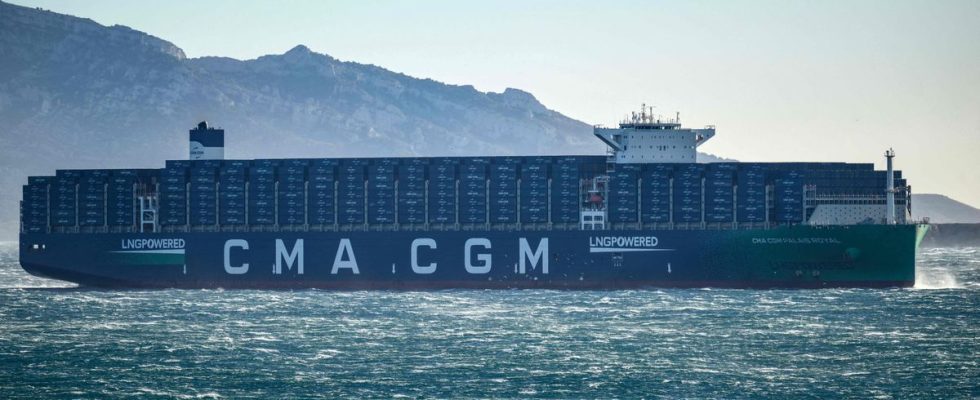It was noted: after two years of running over us in terms of purchasing power and receipts, inflation was finally going to calm down in 2024. But that was without counting on the least expected “butterfly effect” of this end of the year. Acts of piracy in the Red Sea.
Coming from Yemen, the Houthi rebels say they are acting in retaliation for the bombings carried out in Gaza. They target any ship “with links to Israel”. And by “links with Israel”, the rebels are casting a wide net. It is not enough for a boat to come or go there. Any ship of a Nation having premises with the Jewish state – or doing business with it – is considered a target. It is therefore not good to sail in the Red Sea these days.
12% of global maritime traffic
Faced with this threat, many ships decide to no longer use these waves. In recent days, four of the five largest shipping companies in the world – CMA CGM, Maersk, MSC and Hapag-Lloyd – as well as the British oil tanker BP, have announced that they will no longer use the Bab Al-Mandab Strait.
Only 27 kilometers wide – making ships easily interceptable – this strait allows you to enter the Red Sea from the Gulf of Aden, then cross the Suez Canal and arrive in the Mediterranean, towards European ports and North Africa. “It is therefore an extremely important place for maritime traffic, since it connects Europe and West Africa to Asia,” notes Sébastien Jean, economist specializing in international trade and research director at the National Research Institute for Agriculture, Food and the Environment (INRAE). Around 12% of international maritime traffic passes daily through the Suez Canal, which goes almost nowhere if the Bab Al-Mandab Strait is blocked on the other side.
Energy also impacted
To these Asia-Europe trade exchanges is added a third pole, and not the least: the Middle East, its oil and its gas. The Red Sea borders Saudi Arabia, which has the world’s second largest reserves of black gold. It also remains a formidable European shortcut for Qatar and its gas, specifies Benjamin Poba, economist specializing in energy. “Eight million barrels of oil circulate every day on the Red Sea,” explains the expert, “as well as more than 5% of global shipments of liquefied natural gas. »
And to bypass the Red Sea and reach Europe and/or Asia, the “alternative” solution is to follow all the African coasts via the Cape of Good Hope. Which is much, much longer. “It may take one to two additional weeks of navigation,” says Sébastien Jean. In addition to disrupting maritime flows, this lost time is obviously not without consequences on costs: more fuel, more staff salaries… And therefore, ultimately, higher prices once you arrive at your destination. All products coming from Asia are impacted: clothing, raw materials like iron, and everyday objects made there, like toys (but don’t panic, the Christmas ones have already arrived a long time ago).
2021 worse
This is particularly the case for Europe, West Africa, the Middle East and India. “These are the countries that usually benefit the most from the Red Sea, because they are geographically closest to the Suez Canal or the Bab Al-Mandab Strait. For China, this impacts prices a little less, because the differential between going via the Red Sea or the Cape of Good Hope is smaller,” continues Sébastien Jean. Since the start of the raids by the Houthis, the price of a barrel of Brent has increased by 7% and exceeded the symbolic mark of 80 dollars.
This scenario perhaps reminds something to the most news fans among you. Between March 23 and 29, 2021, a stranded container ship blocked the Suez Canal. When the passage reopened, 425 ships were waiting. The specialist magazine Lloyd’s List had then calculated that each day spent clearing the passage disrupted the circulation of 9 billion dollars of additional goods.
But what is happening now could get worse. “The grounded ship was certainly a big problem, but one that we knew would be resolved within a few days. There, the situation could last several months, there is no defined end, which would have a much greater impact on global traffic,” fears Sébastien Jean. The same goes for oil and energy. “In 2021, given that the incident was short-lived, the countries had drawn on their reserves and the price of the barrel had not been too impacted,” relays Benjamin Poba. To avoid wasting too much time, the United States announced a coalition of 10 countries, including France, to calm the Houthi desires. But how long will it take them to get there? Come on, happy new year 2024 anyway.

